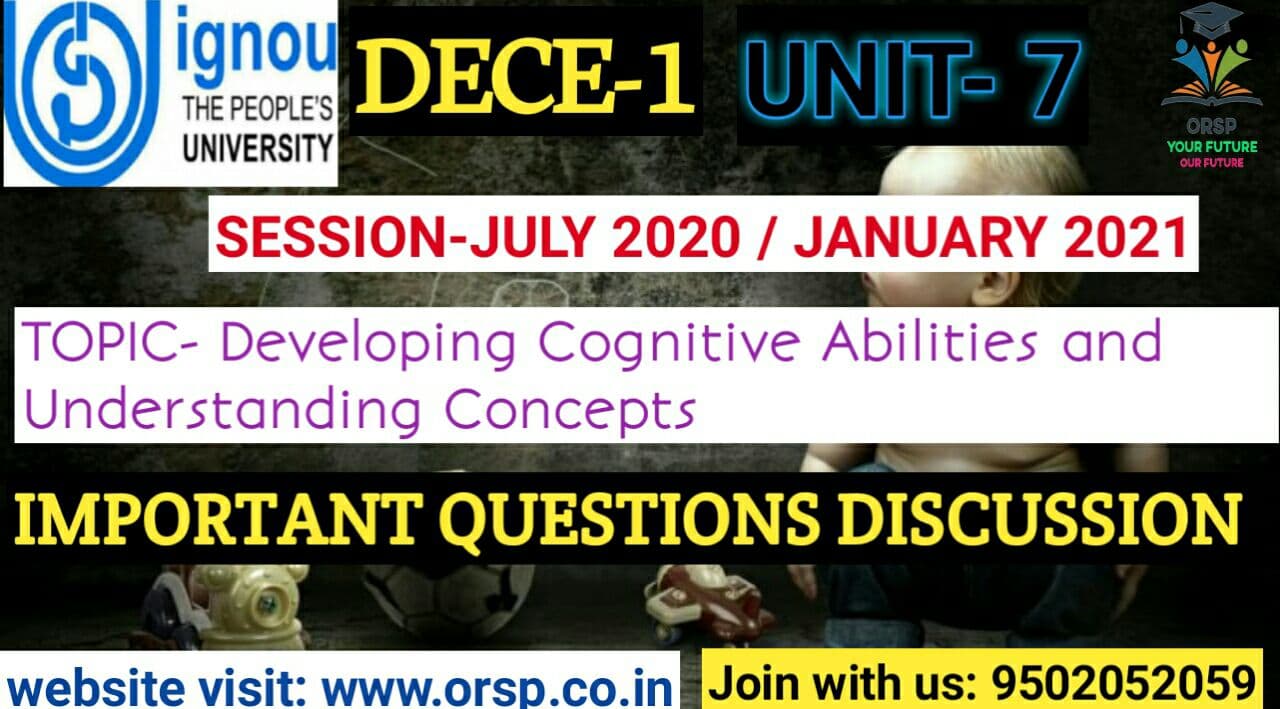DECE3 Unit 7 (Important Question And Answer)-IGNOU-ORSP
https://youtu.be/vSurOizdYeo
Check Your Progress Exercise 1
Answer the following questions in the space below.
1. What do you understand by the term ‘mental disability/mental retardation’?
- When a child’s intellectual functioning is slower compared to others of her age, it shows that the child has a mental disability.
- Mental disability slows down physical and mental growth and the development in many areas motor, language and communication, cognitive, social, self care, and academic skills. Whether the child’s development is slowed, down in one or more areas and the extent to which it is slowed, will depend on the extent of retardation.
‘मानसिक विकलांगता/मानसिक मंदता’ शब्द से आप क्या समझते हैं?
- जब किसी बच्चे का बौद्धिक कार्य उसकी उम्र के अन्य बच्चों की तुलना में धीमा होता है, तो यह दर्शाता है कि बच्चा मानसिक रूप से विकलांग है।
- मानसिक विकलांगता शारीरिक और मानसिक विकास को धीमा कर देती है और कई क्षेत्रों में मोटर, भाषा और संचार, संज्ञानात्मक, सामाजिक, आत्म-देखभाल और शैक्षणिक कौशल के विकास को धीमा कर देती है। क्या बच्चे का विकास धीमा है, एक या एक से अधिक क्षेत्रों में धीमा है और किस हद तक धीमा है, यह मंदता की सीमा पर निर्भर करेगा।
2) State whether you agree or disagree with the following statements.
a) A child with a mental disability functions at a level higher than other children of her age.
Disagree. The child functions at a lower level.
b) The extent to which mentally disabled children’s development is affected in different areas will vary from child to child. Agree
c) Mildly mentally disabled children are often not seen as different from other children until later age. Agree
d) Profoundly retarded children will benefit from academic instruction in a regular school.
Disagree. The child will find it difficult to keep pace with academic instruction in a regular school.
e) Mildly and moderately retarded children can be trained to become economically independent. Agree
f) Mental illness is the same as mental retardation.
Disagree. Mental illness is a disease but mental retardation is not a disease or illness.
बताएं कि आप निम्नलिखित कथनों से सहमत हैं या असहमत।
a) मानसिक रूप से विकलांग बच्चा अपनी उम्र के अन्य बच्चों की तुलना में उच्च स्तर पर कार्य करता है।
असहमत। बच्चा निचले स्तर पर कार्य करता है।
b) अलग-अलग क्षेत्रों में मानसिक रूप से विकलांग बच्चों का विकास किस हद तक प्रभावित होता है, यह हर बच्चे में अलग-अलग होगा। इस बात से सहमत
ग) हल्के मानसिक रूप से विकलांग बच्चों को अक्सर बाद की उम्र तक अन्य बच्चों से अलग नहीं देखा जाता है। इस बात से सहमत
घ) एक नियमित स्कूल में शैक्षणिक शिक्षा से अत्यधिक मंद बच्चों को लाभ होगा।
असहमत। बच्चे को एक नियमित स्कूल में शैक्षणिक निर्देश के साथ तालमेल बिठाना मुश्किल होगा।
ई) हल्के और मध्यम रूप से मंद बच्चों को आर्थिक रूप से स्वतंत्र बनने के लिए प्रशिक्षित किया जा सकता है। इस बात से सहमत
च) मानसिक बीमारी मानसिक मंदता के समान है।
असहमत। मानसिक बीमारी एक बीमारी है लेकिन मानसिक मंदता कोई बीमारी या बीमारी नहीं है।
Check Your Progress Exercise 2
Answer the following questions in the space below.
1) What are some of the factors you will consider while identifying a mentally disabled child ?
a)The child’s appearance may be different from others – the head may be too large or too small, eyes may be slanting, the forehead narrow; the child may have a dull expression on the face.
b)The child’s behaviour – the child may have little speech, have difficulty in understanding instructions, may not be able to attend to tasks for long, may not have complete bladder control, may not play actively with other children, body movements may be clumsy.
मानसिक रूप से विकलांग बच्चे की पहचान करते समय आप किन कुछ कारकों पर विचार करेंगे?
क) बच्चे की उपस्थिति दूसरों से भिन्न हो सकती है – सिर बहुत बड़ा या बहुत छोटा हो सकता है, आँखें तिरछी हो सकती हैं, माथा संकरा हो सकता है; बच्चे के चेहरे पर सुस्त भाव हो सकता है।
बी) बच्चे का व्यवहार – बच्चे के पास थोड़ा भाषण हो सकता है, निर्देशों को समझने में कठिनाई हो सकती है, लंबे समय तक कार्यों में भाग लेने में सक्षम नहीं हो सकता है, मूत्राशय पर पूर्ण नियंत्रण नहीं हो सकता है, अन्य बच्चों के साथ सक्रिय रूप से नहीं खेल सकता है, शरीर की गतिविधियां बेकार हो सकती हैं .
2)What are some of the factors during the postnatal period that can cause mental disability? How can this be prevented?
- Protein calorie deficiencies, lack of essential vitamins. These can be prevented by taking an adequate nutritious diet.
- Infectious diseases. Some of these can be prevented by immunization and maintaining hygiene
- Injury to head.
प्रसवोत्तर अवधि के दौरान मानसिक विकलांगता का कारण बनने वाले कुछ कारक क्या हैं? इसे कैसे रोका जा सकता है?
- प्रोटीन कैलोरी की कमी, आवश्यक विटामिन की कमी। पर्याप्त पौष्टिक आहार लेने से इन्हें रोका जा सकता है।
- संक्रामक रोग। इनमें से कुछ को टीकाकरण और स्वच्छता बनाए रखने से रोका जा सकता है सिर में चोट।
Check Your Progress Exercise 3
Answer the following questions in the space below.
1) Imagine that you are working as an educator in a child care centre. A mother of a severely retarded six year old child comes to you for help. She has totally given up hope in her child. She is depressed and does not think her child can do anything. What advice would you give to the mother?
a)Her child can improve his level of functioning if proper training and stimulation is provided.
b) You may give example of a similar child, if you know any.
c) Explain to her how she can begin training the child at home and the principles involved in training.
d) Visit her at her house at intervals to keep her morale high.
e) Ask her to show her child to a health worker/doctor.
f) If her depression does not get treated after quite some time, refer her to a counsellor.
कल्पना कीजिए कि आप एक बाल देखभाल केंद्र में एक शिक्षक के रूप में काम कर रहे हैं। एक गंभीर रूप से मंद छह साल के बच्चे की माँ मदद के लिए आपके पास आती है। उसने अपने बच्चे से पूरी तरह उम्मीद छोड़ दी है। वह उदास है और उसे नहीं लगता कि उसका बच्चा कुछ कर सकता है। आप माँ को क्या सलाह देना चाहेंगे?
a) यदि उचित प्रशिक्षण और उत्तेजना प्रदान की जाए तो उसका बच्चा अपने कामकाज के स्तर में सुधार कर सकता है।
ख) आप ऐसे ही किसी बच्चे का उदाहरण दे सकते हैं, यदि आप किसी को जानते हैं।
ग) उसे समझाएं कि वह घर पर बच्चे का प्रशिक्षण कैसे शुरू कर सकती है और प्रशिक्षण में शामिल सिद्धांत।
घ) उसका मनोबल ऊंचा रखने के लिए समय-समय पर उसके घर जाते रहें।
ई) उसे अपने बच्चे को स्वास्थ्य कार्यकर्ता/डॉक्टर को दिखाने के लिए कहें।
च) यदि उसके अवसाद का काफी समय बाद भी इलाज नहीं होता है, तो उसे काउंसलर के पास रेफर करें।
2) A parent of a moderately retarded child comes to you and says that though he wants to teach his child as much as is possible, he is not able to make much progress because the child becomes restless very soon. Also, the child does not remember much of what he has been taught the previous day. How can you help the parent ?
a) Explain to him the characteristics of mentally disabled children – that they have a shorter memory and attention span and so become restless easily and forget things.
b) Explain to him the principles in training the child at home
c) Help him to realize the achievements of his child.
d) Visit the family regularly to help them.
एक मध्यम रूप से मंद बच्चे के माता-पिता आपके पास आते हैं और कहते हैं कि यद्यपि वह अपने बच्चे को जितना संभव हो सके पढ़ाना चाहता है, वह ज्यादा प्रगति नहीं कर पाता है क्योंकि बच्चा बहुत जल्द बेचैन हो जाता है। साथ ही, बच्चे को पिछले दिन उसे जो कुछ सिखाया गया है, उसे ज्यादा याद नहीं है। आप माता-पिता की मदद कैसे कर सकते हैं?
क) उसे मानसिक रूप से विकलांग बच्चों की विशेषताएँ समझाएँ – कि उनकी याददाश्त और ध्यान की अवधि कम होती है और इसलिए वे आसानी से बेचैन हो जाते हैं और चीजों को भूल जाते हैं।
ख) उसे घर पर बच्चे को प्रशिक्षण देने के सिद्धांत समझाएं
ग) उसे अपने बच्चे की उपलब्धियों का एहसास करने में मदद करें।
घ) परिवार की सहायता के लिए नियमित रूप से उनके पास जाएँ।
3) State whether you agree or disagree with the following statements.
a) Mentally retarded children show more behaviour problems as compared to other children. Disagree
b) Mentally disabled children need greater practice before they can learn anything. Agree
c) Talking to a mentally disabled child who does not have much speech is a waste of time. Disagree
बताएं कि आप निम्नलिखित कथनों से सहमत हैं या असहमत।
a) मानसिक रूप से मंद बच्चों में अन्य बच्चों की तुलना में व्यवहार संबंधी समस्याएं अधिक होती हैं। असहमत
b) मानसिक रूप से विकलांग बच्चों को कुछ भी सीखने से पहले अधिक अभ्यास की आवश्यकता होती है। इस बात से सहमत
ग) मानसिक रूप से विकलांग बच्चे से बात करना जिसके पास ज्यादा भाषण नहीं है, समय की बर्बादी है। असहमत
Welcome To
Odisha Regional Study Point
We Allow the best exam preparation for SSC, RAILWAY,BANKING,CT,BED,OTET,OSSTET,ASO,RI,AMIN, DECE(IGNOU) Navodaya(5th,6th) , BSE(Standard 9TH & 10TH) AND CBSE (Standard 9TH & 10TH) In ଓଡ଼ିଆ Language…
Why opt ORSP?
✅Daily Free Live class
✅Daily Free practice Quiz
✅FREE Live Tests Quiz
✅Performance Analysis
✅All Govt Exams are Covered
Join With us As per Schedule
And
Happy Learning…
Thank You
ORSP
(9502052059)
Subcribe Youtube Channel Link-
Join Our Telegram Channel(ORSP DISCUSS)







1 thought on “DECE3 Unit 7 (Important Question And Answer)-IGNOU-ORSP”